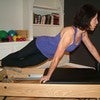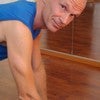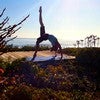Description
About This Video
Transcript
Read Full Transcript
My name is Paul Weiler. Carola is my aunt, my mother's sister, and I've known Carola, well I've known of Carola or known her personally until she passed away in I think 2000, was it 2000? I only really knew her from when she came to the United States. That was at, in the middle of World War II in 19, early 1940s, 1941, two, three, somewhere in there. I was a little boy. I was about six or seven years old. I have various recollections of her from then until I moved out of New York. When I finished college, I left New York and then I only would see her for family events and occasionally here and there.
The fact that she was a dancer and a roller skater and a contortionist was part of the family lore, if you will. And one of my early recollections of Carola was she would come to our apartment in Queens where we were living and I would get her to do headstands and handstands for me, which of course she obliged and she did very nicely. And then she taught me how to do that too. So here was this little kid, you know, and I was essentially playing various kinds of acrobatic things with my aunt Carola. As I mentioned earlier, she was a very volatile personality. I mean, she had huge mood swings and she would carry on in strange ways from time to time. And she and my mother had a volatile relationship. Actually Carola's relationship with most people was probably volatile. But so much so that my grandfather recognized that they would fight like cats and dogs. And so he named my mother Katze, which is German for cat, and he called Carola Hundie, which is German for little doggy because they fought like dogs and cats.
Carola's career choice was viewed by my family, as near as I can recall it, as a given. That's the way she was. Now is that really what my grandfather and grandmother thought? Probably not. My grandfather was a chemist when he came to this country. He was teaching chemistry at NYU. He was a philosopher. So this was kind of, you know, a little far out from the norm than he would have expected. But again, from what I knew, you know, Carola was Carola, this is who she is, here's your aunt. And that's the way she was. So it was never anything unusual except in so far as Carola was an unusual and very interesting personality to begin with.
My mother probably told me some stories about them growing up in Germany and to be perfectly honest, I can't remember any in particular except that they were, you know, they fought, they were very different people. My mother studied music at a conservatory and she sang. So there was that artistic component that Carola displayed even to a greater degree. They were very different people. I don't think they had much in common. Even as adults, they were very different.
My relationship with Carola developed, in varying ways, in different facets over time. As I mentioned earlier, my first recollections are of her teaching me to do a headstand. There was another occasion which was not so happy when she was threatening suicide. Yeah. That's a surprise. And the family was very distressed with her and what are they going to do? And it turns out that somehow or another I was able to calm her down and bring her back to, okay, this is going to be alright. Everything is going to work out. So that's one of those early recollections. Another recollection that I have of her, she had a dance studio in Manhattan somewhere near Times Square. And one summer when I was off from school, I would go ride the subway from Queens to Times Square and I would participate with her because she had me as a student, I guess. But I remember doing that on a regular basis through that one summer. And that was, that was fun. I think that was, it wasn't a Pilates thing. It was a dance class for children. No, I think it was adults, young adults. I was probably 12 or 13 at the time.
Carola's history is a mixed one and I suspect there's a lot of stuff about Carola's history that may not be correct. Because obviously the family was Jewish and World War II broke out or it was about to break out. My grandparents, Carola's parents left Frankfurt, Germany and moved to New York City. Now my grandmother was an American citizen. She was born in New York, which helped a lot. And she moved from New York. She was a Rosenberg. She moved from New York to Germany when she was a young child and basically grew up there, but she was still an American. Once an American, always an American, right? So they, my grandmother and grandfather, emigrated. I want to say 1938 or so. And then my family and I left shortly thereafter. Carola chose, instead of coming to the United States, she chose to go to France. Now you've got to remember she was interested in the theater and dancing and so obviously France was a place to go and here we are, World War II is breaking out, the Nazis are doing their thing, and Carola was interned in some kind of a camp. I'm not sure if it was a regular concentration camp. But while she was there, she met a man named Marcel Neidorf. Yes, that's his name. Marcel Neidorf. And the family lore is that, that was a love affair. And apparently it ended badly because I have recollections of Carola being very upset. This goes to the question of her volatility, very upset about the way this thing ended. I don't know what happened to Marcel, whether they just broke it off or whether he got killed, I'm not sure what happened there, but it was over and she got out of this internment camp or concentration camp and then came to the United States in the early forties, so she had this background of a lot of volatility, ups and downs. She was a volatile personality to begin with. She was very creative and interested in the arts and she pursued that further after she got to New York. So that, I think that kind of just gives a little bit of history as to how she came to be who she was. We're all influenced by what happened to us in the past.
Edgar was a very different person. He was a very quiet, withdrawn, gentle soul. Almost, you could say the exact opposite where Carola was volatile and bouncing around all the time. Edgar was very quiet and calm. And the connection, I always thought they were a strange couple, and I didn't see her with this guy. He was a very different kind of person. I didn't see him. I was a teenager or whatever. But the connection was Carola was very much into the French thing because she'd spend time in France and Edgar had a job with a French newspaper called France-Amerique. And I think that was the connection. And that's, I think, how they met each other. And eventually they got married, they never had any children, and they lived in her apartment, or their apartment, on West 58th street, I think it was? And I remember going there a number of times for holidays and various events. And one of the funny things Carola taught me was what kind of jewelry to wear with what kind of clothing. So if I had a brown suit on or something, I should wear gold cuff links and tie clasp and if it was blue or black then it should be silver. Any little things like that stick with me.
Well as I mentioned, and I can't remember how it was off camera or on camera, but she had this severe injury. She was a roller skating artist and a contortionist and I'm not sure what she was into at the time, but she apparently hurt, I think it was one of her knees. And apparently it was quite a severe injury, which maybe today would have resulted in a knee replacement. But she went to Lenox Hill Hospital and there she met this doctor, Henry Jordan, is that his name? And he introduced her to Joseph in terms of rehabilitating herself and that's how she got started with the Pilates. I was aware that she was the first, or at least one of the earliest disciples or an instructor of Joseph Pilates, and that she initiated a lot of help for people, mainly dancers and some celebrities. Apparently she got the right kind of initial contacts through Dr. Jordan, I presume, and that kind of built up this clientele for her, which was a relatively select one, at least that's my impression, that it was a select clientele. And so once you start that kind of thing, you know, they tell each other and it grows, and she did all of this out of her apartment. She had the same kind of equipment that you have here in her apartment. And when we had family things there, she moved it around and she again, a very meticulous, very highly structured personality which sometimes led to conflict. I was going to say just now she was not very flexible, but that's not really true. She wasn't flexible in some regards but she obviously was very flexible in others because if you look at her life story, you know, she accommodated what befell her and moved ahead and that requires flexibility. But then again, once she was set on something, it was tough to change her mind.
I was very aware of the angina. My grandfather had it. I've got cardiovascular problems, although obviously medication is a whole lot more advanced today. So that kind of runs in the family. I was not aware of her physical problems. What I was aware of, one time she was in the hospital and my wife and I went to visit her, and then subsequently walked with her from a restaurant to her home. And I remember her talking about her lack of being able to do everything she wanted to do and was able to do. And she said something that stuck with me. She said, "You know, I can't do everything I'd like to do or I want to do, but I'm going to do everything I can." And that was Carola. She stuck with it right to the end and did what she could do. And you know, like I said earlier, it was Carola's way or it wasn't any way at all.
You know, I never did see Carola around children. I think I was the only child I ever saw her around. Typically I saw Carola with adults, young adults. I'd never seen her with children, which kind of surprised me that she wrote this book for children. She obviously had some contact with children because she did write the book, but I never was a party to that. In fact, it's too bad. I might've had a different kind of relationship with her had I been party to some of these relationships she had with kids.
I heard Carola talk about her work in very positive terms and she was very much into it and very convinced of its benefits. I never did hear her talk about Joseph Pilates or any of the other professionals that she dealt with. And I never met any of those people either. But it was clear from being in her apartment and talking with her that she was very much dedicated to this and thought this was very, very beneficial for people. And indeed, it turns out that it was.
I did not, and I don't think anyone that I can recall ever participated in the Pilates that she did. And thinking back, I don't think she encouraged it. I don't think she ever came to me and said, "Hey, you know Paul, you really ought to come down and do this." It didn't seem to be that kind of thing with her.
I guess maybe what you're interested in is what do I see as her basic characteristic or trait, or the most admirable thing about her perhaps, and I think that would be her drive, you know, her commitment to what she believed in and her willingness to do whatever it took to achieve the goals that she thought mattered and were important. And she imparted that sense of commitment and drive to me and not so much through the Pilates, but as a conversation and as recognition of the kind of person that she was.
I would see Carola after I moved away, typically when we would come back to New York for an event, or birthday, or unfortunately funerals, or whatever the event was. And I would see her and then near the end of her life, we came to visit her once in the hospital and another time we came and we went out to dinner together. She had a favorite restaurant right near where she lived. And I can't, I was trying to remember the name of it the other night, and I can't, it was somewhere in the mid fifties. It doesn't matter. But we went there for dinner and then we walked her home and that's when we had this little conversation about, you know, I can't do everything I want to do, dammit, but I'm going to do everything I possibly can.
Comments
You need to be a subscriber to post a comment.
Please Log In or Create an Account to start your free trial.















